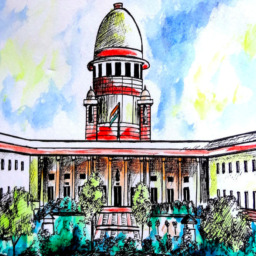Introduction
In India, the expansion of education has been amazing. Aside from these hopeful characteristics, the educational system is harmed by some unkempt enterprises and politics in the educational sector. The majority of Indians want to provide their children with a good education. Corruption has infiltrated the educational system. Instead of stressing the concept of total human development, modern educational institutions focus strongly on moneymaking and consumerism. Corruption used to be limited to government offices, business organizations, and police stations, but it has now grown its roots in the educational system as well. Schools are no longer a sanctuary of learning, but rather a market for low-quality learning.
Corruption in the education system is defined as an organized use of public office for private gain, with a significant impact on educational goods and services availability and quality, as well as educational access, quality, and equity. India’s educational system is currently beset by inconsistencies. Regulating or oversight entities in India’s educational system are also involved in corruption cases. The comprehensive Prevention of Corruption Act, 1988[1] is India’s primary legislation dealing with combating corruption in government agencies and public sector businesses. The judiciary has taken a particular interest in laying the groundwork for the fight against unethical, malice-driven, profit-making acts by public officials at the expense of the people they are supposed to serve over the years.
Problems in the education system
The importance of education in today’s world cannot be overstated. But how bright can the future be when education itself is rigged. The corruption is a result of the new challenges in the education system such as decentralization, growth of competition among the students, etc. In the education system, corruption has taken its grip by the bribes being paid for admission or good grades and many more other ways such as embezzlement of funds allocated to purchase teaching material or for the building of the school’s infrastructure. All this just comes down to the poor quality of education, limited access to resources, and a corrupted educational system. The governing bodies governing the educational institutes form rules, regulations, and guidelines from time to time to regulate the functioning of educational institutes. Many educational institutions are currently unable to affiliate with these regulatory bodies because they lack[2] the minimal teaching and non-teaching staff, laboratory, and equipment requirements set forth by the regulatory body.
Many private colleges have begun offering courses in a variety of disciplines without the necessary infrastructure or trained instructors. This growth has led to the selling of prestigious degrees as some goods. Corrupt educational institutes make money through Entrance tests, coaching centres, etc. Under the guise of a seat quota for management, they are exploiting donations to obtain money for admissions. Institutes charge high fees which not everyone can afford. There has also been corruption in the recruitment of the teachers leading to favouritism and poor quality of education. According to a report on education corruption[3] conducted by UNESCO’s International Institute of Educational Planning, India has one of the highest rates of teacher absenteeism in the world, at 25%. Although not all teacher absences are evidence of corruption, they all have a negative influence on student learning. Corruption is rife in India’s student scholarship system, and false nominations pose a serious threat to qualified students, causing delays and a loss of scholarship funds. Drawbacks of the education sector areas: this kind of education makes the mere test and exams a verdict of the intelligence of the student, good character and the talent or skills of the student is being neglected which will lead to the no contribution of this generation in the development of the country. These disgruntled teenagers occasionally come in contact with anti-social elements, prompting them to engage in anti-national, disruptive, and destructive behaviour.
Legal Advocacy in the Educational Sector
The Supreme Court in Subramanian Swamy v. Manmohan Singh[4], took a permissive stance in defining how courts should perceive anti-corruption laws in India, stating unambiguously that in a situation where two constructions are equally plausible, the Court must recognize the one that seeks to corrupt officials over the one that seeks to perpetuate it. In recent years, the education sector has been plagued by disputes and scams. The Supreme Court in 2013 invalidated the degrees of 634 doctors who were involved in the Vyapam Scam and the MBBS Admission Scam in the same year. In both decisions, the Court acted as a defender of the rule of law, emphasizing the aim to construct a nation based on the ideals of ethics and character, where fraud could not be permitted to undermine the nation’s core values. The decision in the matter of State of Gujarat v. Mansukhbhai Kanjibhai Shah[5] is yet another attempt by the judiciary to build on and consolidate previous achievements by broadening the scope of the Prevention of Corruption Act, 1988 to make it more effective in practice. The judiciary in India has always sought to function as an independent and impartial body, dedicated to serving as the custodian of the Constitution of India, and envision a society free from disputes, where transparency and accountability become the bulwark of efficient functioning of the setup.
How can this problem be solved?
There has to be a demand for quality education if the quality of the education improves the demand will rise eventually. All the policies should be clear and easily understandable as they will give clarity to the parents, students, and everyone involved in the process to avoid unfair practices. Reporting of suspected corruption without fear of retaliation, confidential complaint channels are vital for the eradication of the issue. Teachers should be admitted only after checking for proof of their experience and qualification so the quality of the education is not compromised. External audits must be conducted regularly to detect and prevent fraud. In addition, frequent school inspections can help to prevent teacher management and behaviour corruption as it will keep everything in check from time to time if there is an issue that can be resolved. Unfair practices and favouritism should be stopped and admissions should be based on merit. Education must be geared toward the complete development of the human personality as well as the reinforcement of human rights and fundamental freedoms. Corruption in the educational system undermines public trust and lowers people’s ability and willingness to participate in democratic processes.
Conclusion
It is impossible to stress the importance of quality education in developing India for it to achieve higher heights in all areas of life while maintaining its democracy and secularism. India’s low place in global corruption rankings implies that more work remains to be done. To address the issue of corruption, it is critical to strengthen the legal foundations. Accountability in the hiring, advancement, and reward of public officials would go a long way toward realizing the ideal of a corrupt-free society. The conclusion that we might draw is that India can reclaim its status as a wealthy knowledge-rich land rich in ethics and moral beauty even in modern times. The only thing we can do is develop ourselves, and stringent laws are required to recognize the good and penalize the bad, regardless of the sector. Only if all of these actions are implemented will the country see a big beneficial impact.
Author(s) Name: Dakshita Dhage (Maharashtra National Law University, Nagpur)
References:
[1] Prevention of Corruption Act, 1988
[2] Abhinav Singh and Bharathi Purohit (2011a): Fracas over Privatisation, Quality Assurance and Corruption in Indian higher education, Journal of Education and Practice, Vol 2, No 11&12 <www.iiste.org> accessed on 21 January 2022
[3] ‘Prevention of Corruption in higher education’ <https://www.legalserviceindia.com/legal/article-3112-prevention-of-corruption-in-higher-education.html> accessed on 22 January 2022
[4] Subramanian Swamy v Manmohan Singh AIR 2012 SC 1185
[5] State of Gujarat v Mansukhbhai Kanjibhai Shah AIR 2020 SC 2203
















